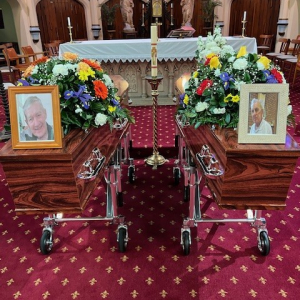Peter MALONE
Unfinished Film, An
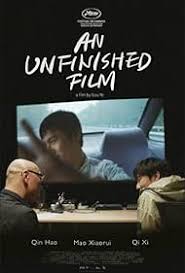
AN UNFINISHED FILM
Singapore/Germany, 2024, 107 minutes, Colour.
Hao Qin Xiaorui Mao, Xi Qi.
Directed by Ye Lou.
Several commentators have referred to this film as “Docufiction”. There is the framework of a fiction story but, eventually, there is documentary footage incorporated into this story.
Audiences will have their memories of their Covid experience, especially in 2020. Audiences watching this film will be remembering, comparing their experiences, especially of lockdown, with what they are watching on the screen. Those who do not want to watch and remember their own experiences, An Unfinished Film is not for them.
While this is a Chinese film, screening in China itself has been forbidden. The producers are from Germany and Singapore.
The film opens with a film group arriving in a Chinese city in 2019, gathering together after 10 years with the idea of completing a film that was unfinished 10 years earlier. There is the director, the main actor, quite a number of the crew. There is a discussion as to why one would make a film, or continue to make a film when they know that it will never have release. We see clips from the unfinished film (actual clips from films of the writer/director, Ye Lou, and films made with the main actor here). So, what seems to be a film about making a film, is suddenly interrupted.
The setting here is not far from Wuhan. It is mid-January 2020, in the weeks prior to the Chinese New Year. While many people from other parts of the world continue their ordinary lives in January even to mid-March, the alarm was early in China, the spreading of the epidemic, the closing down of much activity, the lockdown and its physical and emotional consequences.
Which means that the latter part of the film is very much the drama of the lockdown, initial denial, fighting, locked doors of hotels, confinement to rooms, security guards, and the various participants not able to meet each other, relying on phones, video material. There is the emotional story of the main actor and phone contact with his wife, concerned for their newborn baby. But, much of the film is of looking out the window, the empty streets, ambulances, the experience of isolation.
However, there is an exuberant collage of the whole troupe singing a song to celebrate the New Year, dancing and enthusiasm.
As the film becomes more documentary, there is information about Wuhan, the doctor who revealed the epidemic, his death, the response of the authorities, further crackdowns, then the release – and some postscripts about further government interventions during outbreaks in the following years.
So, memories of Covid, interest in this narrative, audiences checking their covert experiences – and the film for audiences in years to come to indicate that to them what the Covid epidemic experience was like.
Mass and Burial, Noel Mansfield MSC and Kevin Ehlefeldt MSC
Mass and Burial, Noel Mansfield MSC and Kevin Ehlefeldt MSC
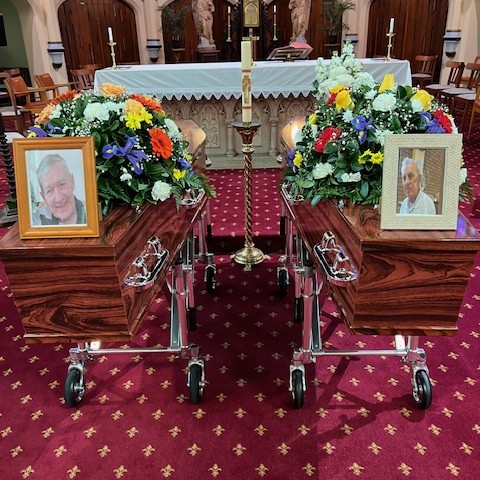
This homily and eulogy for our two confreres from Malcolm Fyfe MSC is a requiem reflection – and also an opportunity to read of the lives and ministries of Noel and Kevin.
With thanks to Malcolm for his text, to Claude Mostowik for Mass photos and John Walker for graveside photos.
Dear Friends, we have come together this morning to commend the souls of Fathers Noel Mansfield and Kevin Ehlefeldt to God, in the presence of their mortal remains. The MSC Community welcomes visitors who have been able to come here for this Requiem Mass.
We offer Father Kevin’s nieces, Mary and Pauline and other family members and friends our sympathy at the loss of someone they have cherished.
To Noel’s sister, Sister Joan in Broome and other relatives and friends, we likewise offer our condolences and our union with them in prayer. In recent weeks I have been in touch with Sister Joan a couple of times. When I offered my condolences, she assured me that rather than grieving, she was very happy at the thought that Noel had gone to God. She also told me that at the same time as we are celebrating Noel’s Requiem here, there are 50 or so St John of God Sisters attending a special Mass for Noel at Subiaco in Perth.
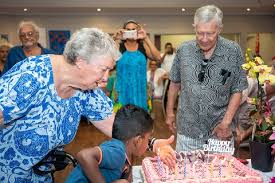
Today at this Mass, we thank God for the lives of two of our MSC confreres, Father Noel and Father Kevin and we are celebrating their impressive and varied ministries. Before proceeding, let me say that it will not be possible to do justice to either of their multilayered life-stories and significant achievements: I can only try to comment selectively on certain aspects presented from just one person's point of view. Last night at the Sharing of Memories you heard tributes offered by many others who have been touched by their lives.
As Christians, our belief in what happens to us when our life on earth comes to an end is supported by an array of Biblical texts. St Paul, for example, in his Letter to the Romans (Chapter 8) states: “If the Spirit of him who raised Jesus from the dead has made his home in you, then he who raised Christ Jesus from the dead will give life to your own mortal bodies, through his spirit living in you.” Again, St Paul’s words in the Second Letter to Timothy (Chapter 4) provide a similar testimony when St Paul’s own life was drawing to a close: “The time of my departure has come. I have fought the good fight, I have finished the race, I have kept the faith. Henceforth there is laid up for me the crown of righteousness, which the Lord, the righteous judge, will award to me on that Day, and not only to me but also to all who have longed for his appearing.” With their commitment to the Gospel message and to the MSC Charism, I believe both Father Noel and Father Kevin could well have used those words of St Paul: “The time of my departure has come. I have fought the good fight, I have finished the race, I have kept the faith. Henceforth there is laid up for me the crown of righteousness”.
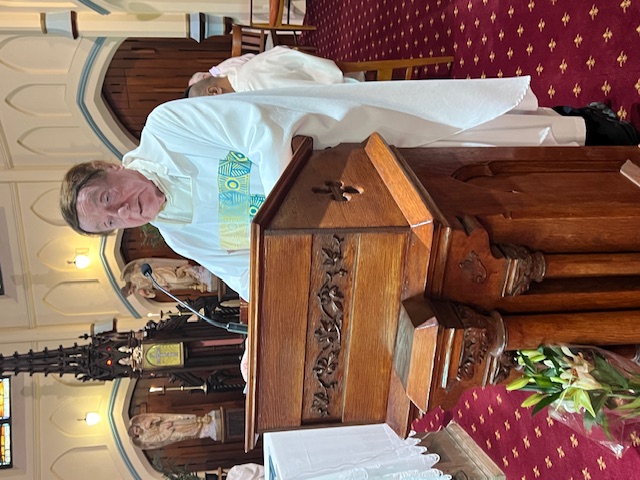
The victory of Jesus over death and sin is the model and pattern of our own destiny. And so, the sorrow and sense of loss that we naturally experience at the death of people we have admired and valued, give way to a celebration of their personal gifts and of all that they achieved throughout their long and dedicated lives. This morning we thank God for the privilege of having known our two departed confreres.
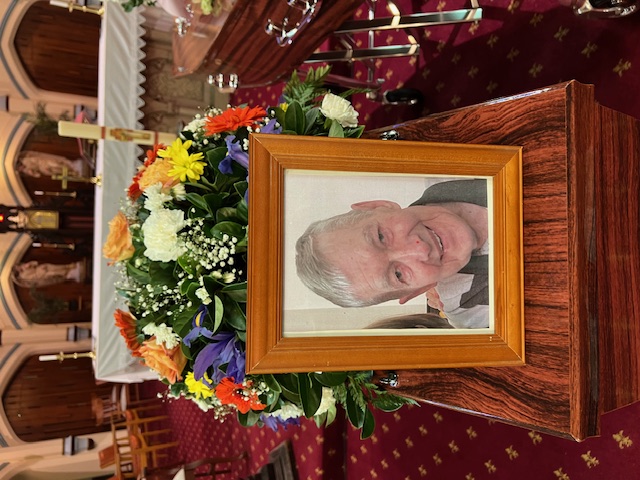
Noel was called to eternal life on Friday May 16th. He was 92 years of age, having been born on New Year’s Day, 1933, in Brisbane. His sister Joan told me that theirs was a family devoted to the Sacred Heart and that their father was a daily Mass goer. When Noel was 5 years old, his sister Anne was born. She had no arms but went on to live a very full life, buoyed up by extraordinary courage and determination. Noel attended Primary School in Bundaberg for 7 years, followed by 4 years Secondary studies at Downlands College, from 1948 to 1951.
Perhaps at this point I should indicate why I asked to celebrate Noel’s Requiem Mass and say something about his life. Let me explain: One day in late January back in 1952, I arrived at Douglas Park for a final year of Secondary studies at the Sacred Heart Apostolic School, the mandated minimum period before one could enter the Postulancy and Novitiate. And so it was almost 75 years ago that I first met Noel Mansfield, along with fifteen other candidates for the MSC priesthood. Together we formed one of the largest batches of clerical candidates for priesthood in our Australian Province’s history. However I am the only surviving member of that noteworthy batch who is available to celebrate Noel’s Requiem.
Well, after that year of Leaving Certificate studies, effectively a sort of Pre-Novitiate or Postulancy, came the Novitiate, with Fr McGuane the very saintly and dutiful Novice Master.
After our 1-year successfully survived Novitiate, the 16 of us travelled down to Croydon Monastery in Victoria for our 3 years of Philosophy studies.
Then, in 1956, due to a shortage of available MSC priest teachers, Noel and I were asked to teach at the Apostolic School. It was a sort of gap year between our Philosophy and Theology studies. In those days, MSC Community life was compartmentalised – priests, brothers, those in Formation: each subset of the MSCs lived and worked within their respective ambience with minimal contact with the other subsets of the Community. And so it was that for one whole year, Noel and I ate and recreated, prepared classes and prayed, largely as a community of two. Quarantined as we were from everyone else, we never argued or disagreed about anything. I think each of us instinctively knew that if an argument started between us, it might never stop.
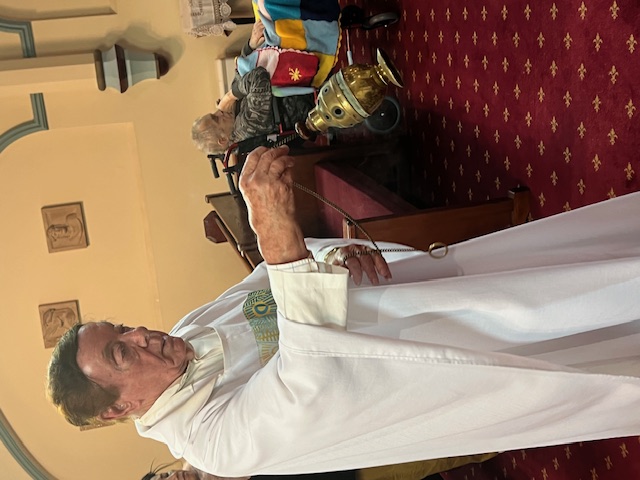
At the start of the following year, Noel Mansfield and I headed down to Croydon Monastery where we settled into the requisite 4 years of Theology studies from 1957 to 1960 inclusive.
But there is more still to our connection. Down through the years, Providence in the form of appointments by the Provincial, cast our fortunes together.
At the start of 1961, Noel and I were both appointed to Monivae College, Hamilton in Western Victoria. It had only been functioning for 5 years in its newly constructed buildings on its current Ballarat Road site. I still have a vivid recollection of the two of us being driven down from Melbourne to Hamilton by the then College Rector, Father J.J. McMahon. The journey on that fearfully hot Summer’s Day in late January seemed endless. Our arrival marked the start of his eight years there as Teacher and Sports Master. It was during that first stint at Monivae that Noel, who had been held back from Ordination because of an epilepsy diagnosis, was ordained a priest in June 1967. He moved on to spend the five years 1969 to 1973 as Year 11 Co-ordinator at Daramalan College in Canberra and he completed his BA studies at the ANU. Then he went back to Monivae at the start of 1974, at a time when the College was transitioning from an all-male College to a co-educational one. He spent the six years ’76 to ’81 as Director of the Junior Campus.
It was only at the end 1977 that our paths diverged.
In 1982 Noel had a year at Fordham University acquiring an MA in Religious Studies, then two years giving College Retreats before heading up to Papua New Guinea for a year at Hagita High School, followed by 6 years as Rector of Chanel College. In 1994, he successfully completed the Spiritual Director course at our Heart of Life Institute. He found this course very helpful both personally and for his subsequent ministry. After a short stint on the Retreat Team he spent several years back at Monivae as Religious Superior and College Chaplain.
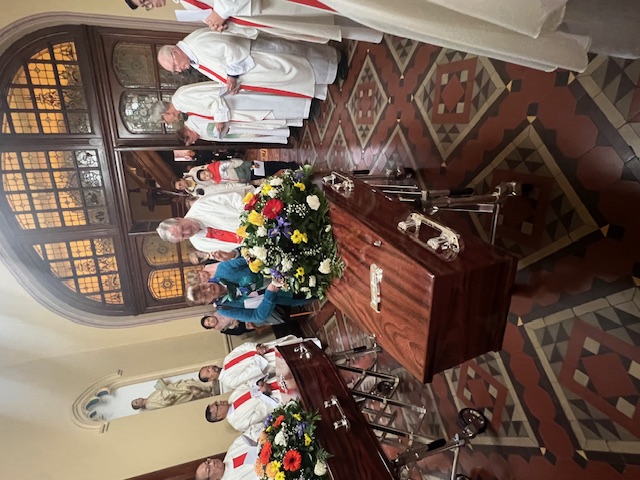
In 1999, he moved to Hindmarsh in South Australia as Assistant priest. He clearly relished this penultimate period of his life, working in the parish, mixing with people of all kinds, visiting the aged and infirm, composing reflections each week for the parish bulletin. It was while he was at Hindmarsh that he authored several books, perhaps the most noteworthy of which consisted of his personal Reflections on the Aging process. He found great enjoyment and enthusiasm in this late-in-life re-invention of himself as a writer. Finally, it was a little over 3 years ago, in April 2022, that Noel came to live at St Joseph’s Aged Care facility. Slowly, slowly, during that time he deteriorated physically, but almost right up until his final days, his mind was clear and he enjoyed a good conversation.
I feel sure Father Noel would want me to thank Sister Pauline and her team for the great love and care that he experienced at St Joseph’s.
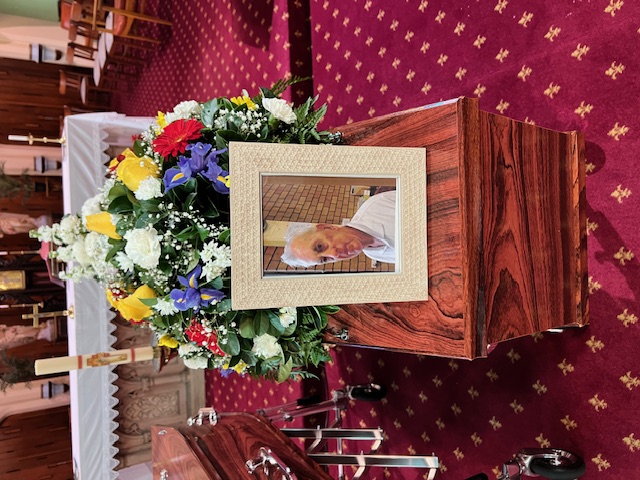
Father Kevin had an even longer life than Noel. He would have turned 96 in 3 months’ time. As most here would know, Kevin had an elder brother who was also a Missionary of the Sacred Heart and who died six years ago at the age of 102.
Kevin made his first profession as an MSC back in 1948 and went on to serve as a Religious Brother in a variety of apostolates. Earlier this year, on 26th of February, Kevin marked 77 years of religious profession.
In his early years as an MSC Brother, Kevin worked at Chevalier College Bowral, as well as at the Sacred Heart Monastery, Croydon, Victoria. In the 1960s and 1970s, he spent many years in the Annals Office at Kensington and helped in promoting the development of the Chevalier Press.
The only time I worked in the same religious community as Kevin was during the year 1975 when he was the Purchasing Officer at Monivae College. Even during that year, I was absent from the College for several months - on sabbatical, after having already worked at the College for 14 years.
Following that one year at Monivae College, Kevin commenced studies for the priesthood at St Paul’s Late-Vocation Seminary and was ordained priest on August 18th, 1979. Following ordination, he ministered in the parishes of Randwick (NSW), Kings Meadow (TAS), Henley Beach (SA), Camp Hill (QLD), and later provided parish supply ministry in the Lismore Diocese.
Coming to Kensington as I did, 18 months ago, I had the opportunity and privilege of getting to know Kevin better. Of course, his more active years were behind him and he had become accustomed to the restrictions that declining health imposes. But I always found it refreshing to sit at his table of choice in our dining room and chat with him. He seemed to be managing the ageing process pretty well but his time with us came to a close rather swiftly, inasmuch as after about 10 days in the Prince of Wales hospital, he passed away last Saturday, May 24. Two of his nieces, Pauline and Mary, both nurses, together with many MSC confreres, were able to visit him and comfort him during that final period of his earthly life.
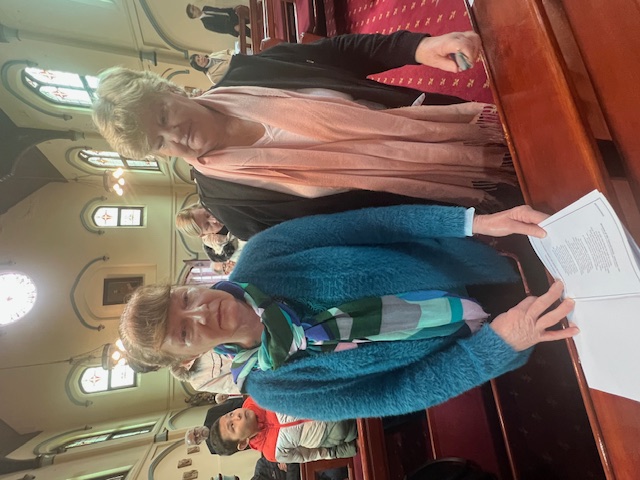
I’m sure Father Kevin would be happy for me to acknowledge the personalised support and care that Catherine, Jane, Belinda and other members of staff provide to all of us MSCs who live here at the Monastery.
With the passing of Fathers Noel and Kevin, the Missionaries of the Sacred Heart have lost two significant members of the Australian Province, gifted, straightforward men of God, each one having had his unique share of life’s challenges; priests respected and appreciated for their dedication and commitment, much loved by parishioners who came to know them in the several places where they ministered.
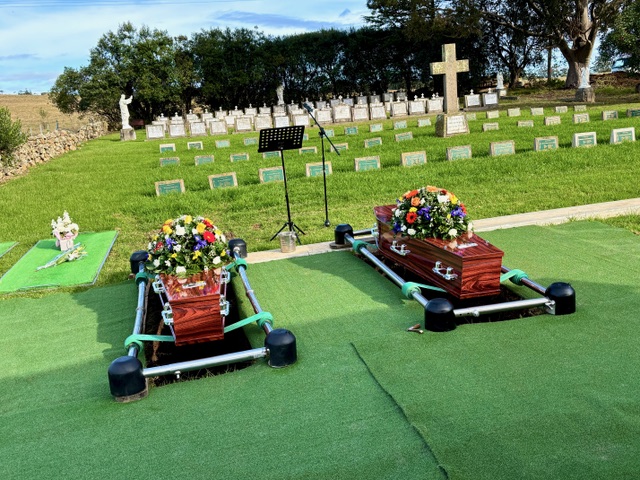
As we continue to celebrate the Eucharist this morning, thanking God for their life and achievements, we can remind ourselves of those words of Jesus that we heard this morning from St John's Gospel: “I am the bread of life – he who comes to me shall not perish. He who believes in me, even if he dies, he shall live forever. He who eats my flesh and drinks my blood has eternal life and I will raise him up on the last day”.
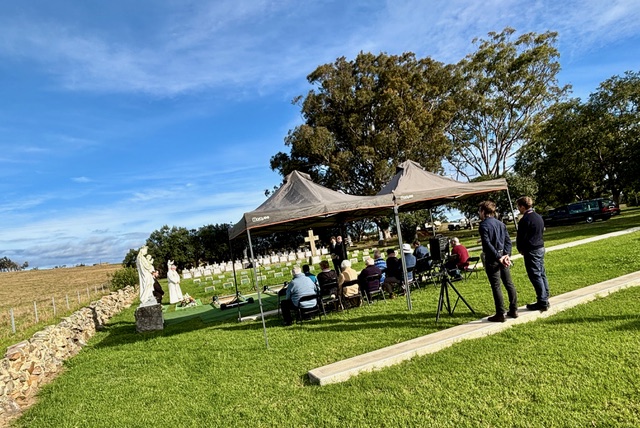
We can be confident that both Father Noel and Father Kevin, who were so faithful to the teaching of Christ and his Mission, so devoted to the presence of Jesus in the Eucharist and to his Mother Mary, under the title of Our Lady of the Sacred Heart, are already enjoying everlasting life, peace and light in the Kingdom of God.
Heart of the Hunter
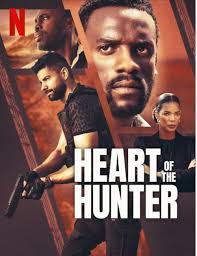
HEART OF THE HUNTER
South Africa, 2024, 105 minutes, Colour.
Bonko Khoza, Connie Ferguson, Maasasa Mbangeni, Tim Theron, Peter Butler, Nicole Fortuin, Sisanda Henna, Milan Murray, Deon Coetzee. Wanda Banda.
Directed by Mandla Dube.
With the ending of apartheid, the South African film industry has developed, not only local films, but also opportunities for American and European productions taking advantage of financial help and African locations. While there has been looking back at the apartheid period, there are also the developments of dramas in the new South Africa.
This thriller presupposes a corrupt politician able to manipulate and to blackmail those with secrets in the past so that he can eventually stand for election as President. He lives a corrupt and extravagant decadent lifestyle. He is aware of the threats, documentation that would expose him. He has a second in command, a woman whose father collaborated with the apartheid regime, who is skilled in surveillance and ruthless. She also has a strong staff and quite elaborate surveillance equipment.
However, the hero of this story is a former member of a rebel group from the countryside, working as an assassin, conscience struck when he was confronted with a young man, refusing to kill him. He then meets a woman with her son, marries her, bonding with the boy, happy family. But, is contacted by a former leader of the uprising who alerts him to documentation that could bring down the would-be President.
He is initially unwilling, taken into custody, his wife interrogated, the boy captured. He is helped by other members of the uprising, especially a young woman who has infiltrated the surveillance staff. There is also a newspaper reporter, now drunken, and an eager assistant, who is contacted also by the uprising leader and alerted to the documentation.
Tension, travels through the countryside, the retrieval of the documents, contact with the journalists, confrontations with those working for the would-be President, shootouts and deaths.
However, of course, justice finally prevails. An interesting action film with contemporary speculations and themes.
- A South African story? Politics, corruption, rebel groups, action?
- South African locations, the city, homes, the police, the mansions of corrupt politicians, surveillance officers? The range of the countryside and its beauty, location for action? The musical score?
- Zuko’s story, strong character, the story from the past, the hooded confrontation, wanting documents in the bag, the killing, the sparing of life? Zuko as a past hired assassin? The effect of this raid, his changing, the scenes of his encounter with his wife, her son and the bonding, then marrying, the happy family life, the strong relationship with the boy?
- The explanation of the political situation, the corrupt politician, his lifestyle, manipulation, the chance of his becoming president? Documents of exposure, the possibility of their being published? Mo as his deputy, in charge of surveillance, her staff, surveillance equipment?
- Johnny Klein, his contact with Zuko, the explanation of the past, the group, the uprising, the documentation, the earth and commitment, leading to the downfall of the corrupt politician? Klein and his past, responsibilities, out of favour, having the documents, burying them, the appeal to Zuko’s loyalty, the pursuit, at the end of the bridge, his death?
- Mo, the background of her father, mixed race, his supporting the apartheid regime? Mtimi and his hold over her? Her staff, Beth? Mo and her ruthlessness, working outside the law? Overstepping the law? Beth, loyal, later qualms? Neladi, working with Mo, the infiltration, the later action, her oath, supporting?
Zuko’s wife, taken, the interrogation, the severity, Neladi helping her escape, having to jump, her falling to her death? Mtimi and taking the boy?
- The journalist’s story, past investigations, drinking, the connection to Johnny Klein? The young apprentice, straightforward, working with him? The investigations, uncovering the information, getting the documents, the publication? Contribution to the unmasking of Mtimi?
- The action sequences, Neladi and her help, the other members of the team, Zuko travelling through the countryside, recovering the documents? The confrontation with Mo, the threat to the boy?
- The sequences with the troops, Tiger, his role, the helicopters, the men, the shootings? His change of heart? Confrontation with Zuko? His death?
- Team, his lifestyle, presumption that he would be elected, the exposure, his downfall?
- The background of South African history, apartheid, uprisings, local districts and political upheaval? The corruption story set in the post apartheid era?
S.W.A.T.: Firefight
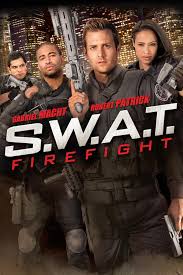
S.W.A.T: FIREFIGHT
US, 2011, 89 minutes, Colour.
Gabriel Macht, Robert Patrick, Carly Pope, Giancarlo Esposito.
Directed by Benny Boom.
This is comparatively brief action show, in his time straight to video. However, it drew on the popularity of films about S.W.A.T as with the television series.
The initial setting is Los Angeles, an episode with the team in action, introduction to Paul Cutler, played by Gabriel Macht, his success, his being ordered to go to Detroit and train the team there for certification with the FBI. Initially unwilling, immediately feeling the hostility of the local commander, played by Giancarlo Esposito, he meets the men, various attitudes, criticism, many scenes of their exercises of training. And there is also a female psychologist played by Carly Pope.
The focus is on an episode with a psychopath played by Robert Patrick and the death of the woman he had as hostage. Motivation for Paul, for the group, and Walter mysterious, tantalising, setting Paul up for mistakes, and eventually an elaborate confrontation.
TThe film moves continuously, some sympathetic characters, the psychopathic villain, and plenty of action for the fans. (And, possibly, the good promotion film for anyone wanting to join S.W.A.T.)
- Audience interest in S.W.A.T, films, television series? Anchored in reality? Imagination?
- The Los Angeles setting, the initial hostage situation? The transition to Detroit, the range of views of the city, police precincts, training precincts, warehouses and crises? The musical score?
- Paul Cutler, experience in Iraq, police, dedicated to his work, in charge of the team, the initial confrontation, negotiating, the backup, the snipers? Discussions with his superior, his being sent to Detroit, unwilling? The scene with the girlfriend, his commitment to his work?
- Attitude towards Detroit, the encounters with Inspector Hollander, resentments, chain of command, relationship to the FBI, the certification of the men? The introduction to the men, characters, attitudes, work, the scenes of their training? The program for certification?
- The episode with Walter? Getting into the building, the confrontation, water and grows, her killing herself? Walter’s reaction? The effect on the team, on Paul, his first loss of a hostage?
- Lori, joining the group, the background of Iraq, comradeship, her skill, shooting, sniper? Part of the team?
- The encounter with Kellogg, his attitude, at the bar, the competition, his being disqualified? His later dealings with Paul collaboration?
- Walter, Government background, as an agent, the collaboration with his partner? The setting up of Paul, entering the wrong house? The motivation, vengeance, Hollander letting Walter go, Walter and his taunting, being present?
- Kim, her work as a psychologist, discussions with Paul, his attraction, the meal, the night together, her being targeted by Walter?
- The buildup to the final confrontation, Walter and his killing of the two agents? The setup, Lori and the explosives, Kim the explosives, the targeting of the team, Walter’s and his attack, his death? The other injuries? The final confrontation, Paul and the fight with Walter’s associate, his death? The timing, the skills with Lori, her escape, sniper? Freeing him, the confrontation with Walter, his falling to his death?
- Hollander and his change of mind, the team, Lori staying, Paul returning to Los Angeles, the invitation to Kim to visit her sister?
Spectral
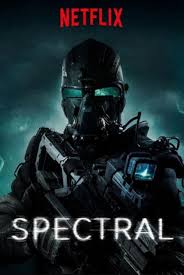
SPECTRAL
US, 2016, 107 minutes, Colour.
James Badge Dale, Emily Mortimer, Bruce Greenwood, Max Martini.
Directed Nic Mathieu.
There are quite a number of spectres in Spectral.
The setting is a blend of the present and the future, arms developments in the United States, experiments, but a civil war in Moldava, the past with the Russian connection, uprisings, devastation.
The film opens with the soldier on patrol, encountering a spectral appearance, white and ghostly, which overcomes him, killing him. The general, place by Bruce Greenwood, contacts Virginia and asks for advice, especially in expert, Clyne, played by James Badge Dale. He is a skilled inventor of defence systems, especially the camera. He is sent to Moldava, explanations from the general, immediately going out on the expedition with his camera, a team of soldiers, some very sceptical.
There are encounters with many spectres, especially seen through the camera, and with devastating effect on overcoming the troops. Accompanying the group is a political and arms adviser, played by Emily Mortimer. The group finds two children, some explanation that the spectres can be warded off by iron filings and other scientific aspects.
A buildup to a final confrontation with the spectres, devastating killings of the soldiers, an escape by helicopter – and the scientist then speculating, rationally, on the possibilities of what they could be, decides, with the help of some theories by Einstein, that the scientists have been speculating on condensation is, and experimenting with human beings, to develop the spectres as a fighting force.
The climax is going to the town, finding the science complex and moral decision about terminating it.
- Title, expectations, science fiction, futuristic, supernatural themes, the ghosts?
- The opening in Virginia, Clyne and his work, vision? The action taking place in Moldova, the Civil War, the ruined city, the military headquarters, venturing out into the streets, the buildings, ruins, the spectral experiences? The musical score?
- The plausibility of the plot? Supernatural beings, or ghosts between life and death? The technology for cover-disguise? The revelation of the scientific advances, success, failures, consequences?
- Audience response to the soldiers, the initial experience with Davis, seeing the spectre, overcome, his death? The sequence repeated throughout the film?
- The general, his concern, contacting Virginia, the discussions with Clyne, his work, his advances? His going to Moldava, the explanations by the general? Fran and her presence, observing, her military perspective?
- The decision to go out into the streets, setting up the camera, the tanks, the camera showing up the spectral vision, the consequences for the soldiers, the many deaths, the many creatures?
- The finding of the children, their father, ceramics, the iron filings as protection? The finding of the soldier hiding under the tub? Joining the squad?
- The squad, the commanders, the various personalities, suspicions, the experience of the spectres, their being overcome, the many deaths?
- Contact, losing contact, the possibility for a helicopter, getting to the landing, exposing themselves to the spectres? The help from the children? The little boy going out, his death? Fran, her scepticism, change of heart, becoming involved?
- Clyne, his character, dedication to his work, the camera, his rational arguments, setting up the camera as the searchlight, highlighting the spectres?
- The buildup to the climax, the escape to the helicopter pad, the helicopter, the rescue? The headquarters gone, meeting with the general?
- Clyne, the background of Einstein, theories of condensation, going to the plant, the huge process, the many spectres, experiments, on human beings, kept alive, the issue of pain? Clyne and his decision to terminate the experiment? Fran wanting the new knowledge?
- The blend of fantasy and reality, military, military developments, science and rational explanations?
Paradis, Le/ Lost Boys
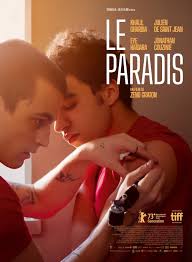
LE PARADIS/LOST BOYS
Belgium, 2023, 83 minutes, Colour.
Kahlil Ben Gharbia, Julien de Saint Jean, Eye Haidara.
Directed by Zeno Graton.
A French language enigmatic title, touches of irony, for a film about Belgian youth in juvenile detention.
The film is brief, sets the atmosphere for a group of young male adolescents, crimes not explained, living in the community, sharing much with their supervisors, meals, sport, practical skills like welding. However, there is certainly a strong discipline. But, interestingly, the high walls of the detention centre are transparent, the outside world showing through.
The film focuses on one young man, Arab background, Joe, a very effective performance, intense, from Kahlil Ben Gharbia. He is quiet, introspective, escapes to a walk along the beach, is interrogated by a supervisor as regards his future, participates in all the activities with the other young man. The group is presented interestingly, distinctive characteristics for each of them, especially a short one with glasses who is often at breaking point.
Another young man comes into the centre, William. Joe is fascinated, and a revealing of his emotions and sexual orientation. Has his own story, the two bonding, even to a kiss and embrace, Joe holding his radio close to the wall for William to hear it…
A film of interactions, the role of the supervisors and authorities, the various activities for the young men, a more positive kind of juvenile detention centre – but with an escape attempt, and the consequences for Joe.
Interesting to compare this film of some kind of juvenile delinquency, very moderate in comparison with some British and American stories of gang members in detention.
- A topical film? Youth, youth detention, crimes, care, rehabilitation?
- A Belgian film, Belgian society, the picture of the youth in detention, the carers, those in authority, comments about judges, cases, difficult relationships with parents?
- The setting, the centre, the transparent wall (contrasting with the enclosed wall at the end of the film)? The conditions, the rooms, meals, recreation, sport, the welding jobs? Creating the atmosphere? The musical score?
- The focus on Joe, his age, Arab background, his life, in juvenile detention, comments about his family? A loner, quiet? His going out, walking along the seafront? With the rest of the young men, interactions? With Sophie and the other members of the staff? Conversations, meals together, strict discipline? The encounter with William, the attraction?
- William, the contrast with Joe, his background, family? Attitudes? Interactions with Joe, the mutual attraction? The radio, Joe holding it to the wall? Together, the kiss, the reactions? William and the regime, interactions with the others? Work?
- The portrait of the of the boys, their ethnic backgrounds, their ages, interactions, friends, playful, intense, the boy with the glasses, sometimes at boiling point? The meals and interactions, jokes, dancing, sport…? The prospects? Planning for the future?
- Joe, sometimes morose, his emotions, Sophie warning him about his emotions and relationships? The fireworks, the painting of the faces, going outside, the return at the gate, the rain, raucous?
- Joe and William, running away, pursued, caught? The repercussions for each? Joe and his frustration, the hearings, the woman in judgement, keeping him for another three months?
- Joe and his final transfer, the new centre, like the present, in the yard, smile, his beginning to run? His future?
Last Bullet/ Lost Bullet 3/ Balle Perdue 3
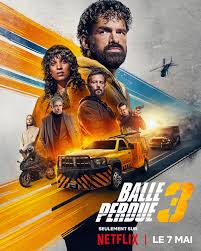
LAST BULLET/ LOST BULLET 3/ BALLE PERDUE 3
France, 2025, 110 minutes, Colour.
Allban Lenoir, Nicolas Duvauchelle, Stefi Celma, Gerard Lanvin, Quentin D'Hainaut, Anne Sarah.
Directed by Guillaume Pierret.
A very French action show, Last Bullet, police, criminals, drug dealing, plenty of action and stunts, appeared in 2020 and was very successful. So, a year or two later, a very successful sequel. Now, a third in the franchise, the French title remaining the same but an alert for English-speaking audiences, not just another Lost Bullet, but the Last Bullet.
The central characters of the previous films reappear, audiences having got to know them well, liking some like Lino, former prisoner, rehabilitated, working on cars, good relationships. But there is also Areski, police, caught up in all kinds of violence, even murder. And, the women in their lives. And, especially, one of the chief of police in the drug squad, totally corrupt, dealing the drugs, some brutal henchman, political deals, and out for some vengeance.
With the new scenario, Areski is hiding in Germany, new name and job, relationship even though has a wife and child at home, becoming the target of the chief but cleverly, with the help of his bike, evading the deathtrap. He returns to France, trying to reconstruct his life, determined to work against the corrupt chief, but paired up with Lino who has to forego some of his vengeful hatred.
In many ways the plot is simple, the two combining, the help from their female collaborators, some more corruption at the top, the setting up of the police chief, and, in the last part of the film, plenty of car and mobile action, stunt work, one of the reasons for enjoying this series of films.
For those coming across this film the first time, enjoyable action. For those following the previous two films, some satisfaction in the conclusion, the good rewarded, the bad defeated.
- The popularity of the first two films? A satisfactory conclusion to the series?
- French action film, action sequences, stunt work, CGI, effects? Cars, chases, buses, the tower and confrontation? Audience response to the action?
- The opening in Germany, introducing Areski, his role in the previous films, criminal, killings, his wife and family, escaped to Germany, working, the control of Resz, corrupt administration, drug smuggling, his work and cover, the relationship, Resz wanting him killed, on the bike, the chase, his outwitting the pursuers, survival, return to France?
- The situation at the Spanish French border, the exchange, the prisons, Resz and his control?
- Lino, his past, present, rehabilitation, working, the relationship with Stiller? With the authorities?
- Rose, corrupt, control, his thugs, trying to kill Areski? The deal with Spain? With the authorities? His working with Yuri? The film’s critique of police and political corruption?
- Areski and his return, working to bring down Resz, the meeting with Lino, memories of the past of the murder, their working together? The role of Stella, the past, present?
- The officer in charge, her attitude, the pursuit of Resz, her doubledealing and exposure?
- The buildup to the confrontation, the cars, the chases, Lino and Stella, Areski and his changing attitudes, wanting to escape? The bus? The final violent confrontation, the cars, the van, the tower?
- Yuri, the attitude of Resz, his change of heart, his final vengeance?
- The style of French action films for the French audience? The impact on international audiences?
Depravity
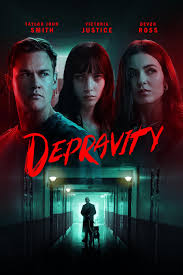
DEPRAVITY
US, 2024, 115 minutes, Colour.
Devon Ross, Victoria Justice, Taylor John Smith, Dermot Mulroney, Sasha Luss, Alex Roe.
Directed by Paul Tamasy.
Depravity is a challenging title. Not just wicked, depraved.
The film introduces us to 3 young people, in their 20s. Alex is handsome, man about town, smug, and, we discover, some rather depraved greed and its consequences. Then there are the roommates, Grace, pleasant and attractive, getting caught up in some violence and becoming the victim of violence. And then there is Aria, an art student, roommate, becoming involved but seeming to keep a distance from what goes on.
What goes on is their suspicions of an older sinister-looking gentleman, who goes on walks with his dog, always looking grim, as mysterious and exotic visitors. There is talk of a serial killer. The trio is tempted to suspect him, find a way into his apartment, getting into the crawlspace above the roof, investigating his room, discovering a great deal of money. But, for the drama, of course, the sinister man returns and there are dire consequences for him and, ultimately, for the others.
Also involved in the action is a glamorous but suspicious woman with a foreign accent who visits, is wary of the disappearance of her patron, bringing along a boyfriend, with an accent and blonde hair like a British teddy boy. Also in the act is a detective, rather more casual than the usual New York detective.
So, all kinds of suspicions, deaths, hiding of bodies, mysterious international criminals, the background of the theft of priceless art, mysterious money hidden away.
Dermot Mulroney is the sinister gentleman next door. John Taylor Smith is the superficially charming but greedy Alex. Victoria Justice is the more glamorous Grace. Devon Ross is the underestimated Aria.
A number of unexpected twists throughout the screenplay – and a twist at the end which some astute audiences might have picked.
- The tone of the title, expectations? As applied to each of the characters?
- The introduction to the central characters, their personalities, age and experience, relationships, Aria, her art, the paintings, her work, reserved personality? Friendship with Grace, Grace more open? Alex, charm, opportunist?
- The apartments, suspicions, Mr Evers, his appearance, sinister, with the dog, walking?
- The background of stalking and serial killers, their suspicions of Mr Evers, wanting to get which room, Alex and his using the roof, Mr Evers returning, Grace on guard, getting out of the situation?
- Mr Evers, the possibility of his being a killer, the finding of the money, the artworks, Tovia and her glamorous style and look, her suspicious of Mr Evers absence, her return, confrontations? Her boyfriend and his menacing presence?
- Mr Evers returning, the guns, Grace, killing him, wrapping his body, lowering it down the chute? Its eventually falling, burning?
- The repercussions of these events on each of the characters, Alex, no conscience, greed, the money, getting rid of the body? Grace, the relationship with Alex, anxieties, some touch of conscience? Aria, her involvement, seeming detachment?
- The police investigations, the detective, suspicions, the money, the artwork? His behaviour with the suspects?
- The criminals, arriving, Tovia and her style? The boyfriend? The dramatic confrontations, hiding, searching for the art? Guns? Fights, shootings? Grace dying? Alex and his being tied up, suspended in the chute?
- Aria, her behaviour, the artwork, the money, involved but seems seeming detachment?
- Alex, his death, greed?
- The search for the paintings, Aria, in the apartment, hiding, finding the paintings – and the irony that she was the art thief?
Exterritorial
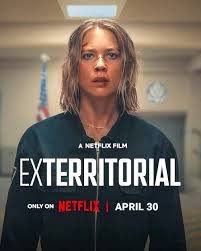
EXTERRITORIAL
Germany, 2025, 109 minutes, Colour.
Jeanne Goursaud, Dougray Scott, Lera Abova, Kayode Akinyemi, Annabelle Manding, Rickson Guy da Silva.
Directed by Christian Zubert.
This is a German action show which means that the filmmakers have admired and learned from American action shows.
The initial focus is on Sara (Jeanne Goursand), the extraterritorial of the title, having served in Afghanistan, seen combat, also found a partner and their having a son, his death, her return to Germany, manifestations of PTSD, anxiety, mania, delusions. However, it seems that an appreciative American firm is offering her a work position in the US. She goes with her son to the consulate to check with passport and travel arrangements.
This part of the film certainly sets a tone. But, at the consulate, she is forced to wait a long time, her son restless and her allowing him to go to the playroom. She returns five minutes later. He has disappeared. The next part of the film is the frantic search, the help of the consulate authority, Dougray Scott, and his assistant, Donovan, Kayode Akinyemi. The Consul herself becomes involved. Her son is nowhere to be found, and looking at the surveillance pictures show only Sarah, that she had come alone to the consulate. Is this one of her PTSD delusions?
After the desperate search, the latter part of the film moves into high-powered action, Sara drawing on her military skills, the layout of the consulate and its various buildings, something like a labyrinth, multistoreyed, long corridors, elevators. And she draws on all her skills to evade detection and pursuers. But she does encounter a mysterious woman also living in the consulate with quite a history. Suspicions, clashes, but then the two working together.
Of course, there is a twist, the unmasking of an official who has a history in Afghanistan of betrayal of secrets to the Taliban and who wants to eliminate Sarah for self-protection.
A variation on familiar plot of disappearances. Some remembering of European involvement in Afghanistan. And then, an action hero, this time a very resourceful woman, going in to no-holds-barred fighting for her son.
- The information from the title, Sara and her work in Afghanistan, return to Germany, PTSD?
- The German setting, the city, homes, outdoors? The move to the consulate, space, interiors, the variety of buildings, the elaborate opening up of the different storeys, corridors, rooms, elevators…? The consulate as something of a labyrinth? The musical score?
- An action film, given Sara’s background? The buildup, her character, her son, the situation, prospects in the US, her son’s disappearance, the search, moving into a violent action scenario?
- The establishing of Sara’s character, Afghanistan, the return, tensions, mental states, delusions, devotion to her son? The initial encounters, people’s reactions? Her going to the consulate, the prospects of work in the United States? The memories of her husband? Taking Josh, entering the consulate, lining up, the surveillance, the wait, taking Josh to the playroom, her return and his disappearance?
- Sara and her motivation, the intense love for her son? Her panic when he had disappeared? Confronting the authorities? The encounter with Erik, with Donovan? The reassurance, her suspicions and anxieties?
- The atmosphere of conspiracy, Donovan and his behaviour, Erik and his charm and reassurance? The intervention of the Consul, her interpretation of the events? Wary of Sara? Checking the surveillance, no images of her son?
- The latter part of the film, action show, Sara and her fighting skills, skills and surveillance, observation, going throughout the building, those pursuing her, the fights? The encounter with Kira, suspicions, her background and being in the consulate, confrontations, reassurances, support, Kira and her help, the dangers? Donovan and the pursuit?
- Sara and the labyrinth, her skills, violent skills, the eventual confrontation with Donovan, the revelation of the truth?
- Erik, his role in Afghanistan, flashbacks, betrayal to the Taliban, his wanting to avoid being exposed, his manipulations of Sara and the situation, the taking Josh?
- The final role of the Consul, the buildup to the final confrontation, the unmasking of the villain, enclosed in the room with Sara, her wits getting out, and reunion with her son?
Cocina, La
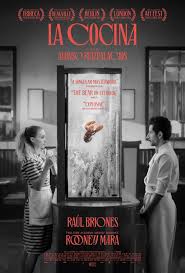
LA COCINA
Mexico/US, 2024, 139 minutes, black-and-white/Colour.
Raoul Briones, Rooney Mara, James Waterston, Anna Diaz, Oded Fehr, Lee Sellars.
Directed by Alonso Ruizpalacios.
A word which comes to mind as we watch this highly-powered drama, is “exhausting”.
The first part of the film, a long film of 2 hours 20 minutes, takes place in a large kitchen of a New York diner, large staff, chef, cooks, waitresses, continual movement, the orders coming in thick and fast, shouting, speed, and tensions, more shouting, some altercations – exhausting for the staff as they go about their business, but, as said, exhausting for us to watch them, the pressures and their exhaustion.
This is a Mexican production from the celebrated Mexican director, Alonso Ruizpalacios. There is a large Hispanic cast, with some Americans. And, surprising to discover, the screenplay is based on a British play of 1957, a play by Arnold Wesker, The Kitchen , part of the movement in Britain in the late 1950s, a move away from the drawing room to a lot of “kitchen-sink” realism.
The film was shot in black and white although, there are some moments of colour, often quite striking, small, sometimes brief, into the black and white. And, especially initially with a young woman arriving from Mexico by ship and trying to find her way around New York to get a job, some blurred black-and-white photography. And, with the language, mixes of Spanish and English.
Which means that the images of the kitchen are images of the melting pot, especially Hispanic/English, of New York City and communities around the US. And, not only the mix, but the role of the American bosses, the hold over their staffs, issues of visas and permits, illegal immigrants, trapped at the whim of the bosses, full of hopes and dreams (especially dramatised in a most welcome quiet part of the middle of the film, some of the staff taking a break in the alley speaking of their dreams and hopes, some realistic, some fantasies).
Tensions rise throughout the film with a number of themes. The accountant finds money missing and one of the managers assumes that it is the key character of the film, the cook, Pedro (Raoul Briones) who has taken the money for his girlfriend, Julia (Rooney Mara) for an abortion. But Pedro does not want the abortion. Julia does and there are consequences. And there is the anger of the chef against Pedro, counting him down for eventual firing. And there is the main boss, with the power, who comes to supervise and check.
And, it all boils over, the pressure on Pedro, Julia’s son arriving, an altercation with one of the waitresses, objectively reasonable but too much for Pedro, frantic, then berserk, chaos in the kitchen, spilling over into the restaurant itself. The desperation of the Hispanics and others of racial and ethnic backgrounds, overwhelming anger and destruction. And, what of the future, the uncertainties of the future?
(And La Cocina is challenging watch at the time of the release, with the executive orders of Donald Trump and the intentions of mass deportations for illegal Hispanics.)
- The reality of Hispanic refugees, legal and illegal, in the United States? Political repercussions on the 2020s, the Trump administration?
- The screenplay based on Arnold Wesker’s 1957 British play? The issues then? The “kitchen sink” dramas? Relevant in the 2020s?
- The black-and-white photography, the realism, the artifice of blurred screens? The colour insertions? The musical score?
- The tone of the opening, Estella, travelling to the US, entry, New York, lost, unable to speak English, searching for Pedro, to get a job? Her arriving, Coming for the interview, the woman waiting, the manager, the interview, accepted, the actual applicant late and not being hired? getting the job?
- The first part of the film, the introduction to the kitchen, the chef, the cooks, the manager, finance? The large kitchen, the various cubicles and areas for the cooks, the specialties? The information about the menu, the style of cooking, the speed, the waitresses? Not seeing the clientele until later?
- The pressure of work in the kitchen, exhausting for those working, exhausting for the audience watching? The volume of sound, the talking, the different languages? The pressures, timing, the orders, the machine with the orders coming through? The kitchen as a microcosm of New York City, the Americans in charge, the Hispanics working, treatment, attitudes?
- The issue of the missing money, the accountant and his concern, Lewis and his attitudes, suspicions of Pedro, his relationship with Julia, his personality, the issue of the abortion, the presumptions about guilt? The continued concern of the accountant, eventually finding the money, Lewis and his accusing Pedro, the truth? The focus on Pedro, his background, working for three years, the relationship with Julia, her pregnancy, the behaviour during the day, kissing, the sexual encounter, yet the harsh reactions, Julia and her concern? Pedro wanting the child? Julia, going to the abortionist, the experience, the return, serving, the blood on her leg? The arrival of her son? The impact on Pedro?
- The variety of personalities, Mark, white, authority, brutality, fights, reconciliations? Influence on the other workers? Their personalities, conversations, memories, joking, serious?
- The flooding of the floor, everybody having to manage? The main chef, 25 years working, attack on Pedro, the counts against him? The arrival of the owner, his manner, talking, meeting people, tasting and testing?
- The waitresses, the busy work, seeing the customers, complaining cost customers, friendly customers? The continued work, refilling the trays? Pedro and the clash with the waitress, arguments, her leaning over, his physical response?
- The break, the quiet, in the lane, the characters, smoking, talking, their dreams, symbolic, the long story about migration, no conclusion, provoking emotion and thought?
- The buildup to the mayhem, the pressures on those in the kitchen, authority, jokes, rivalries, angers, Julia and Pedro’s discovery, her son arriving, her leaving? The waitress, intervening, the violent reaction, his losing his temper, the eruption, the violence and destruction of the kitchen, pouring the rubbish over himself, going into the restaurant, causing mayhem and destruction? Back in the kitchen, on the floor, the chef and his response, the owner coming, the quiet menace, his observing the destruction, the confrontation with Pedro? His future?
- The impact of this film for a Hispanic audience, Latin Americans in New York City, legal and illegal, continued threats, owners owning them, no visas? The impact for the broad American audience and understanding the issues? For audiences outside the US?
